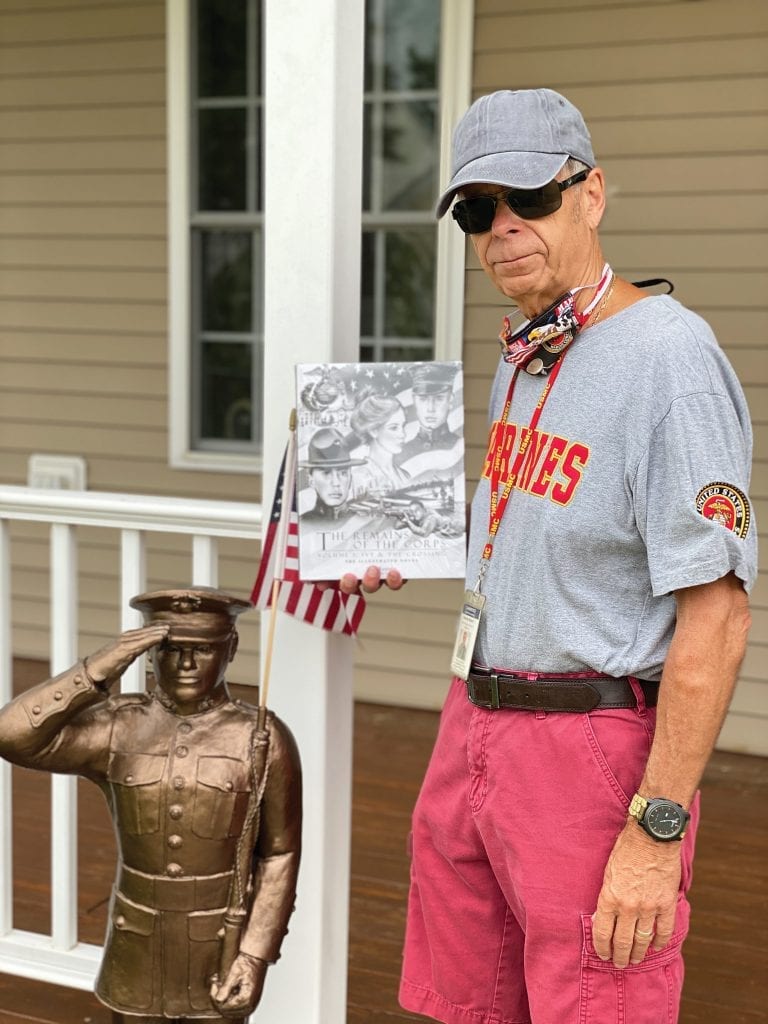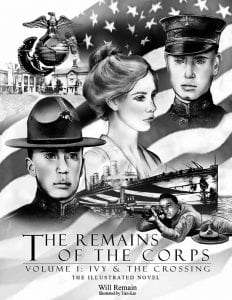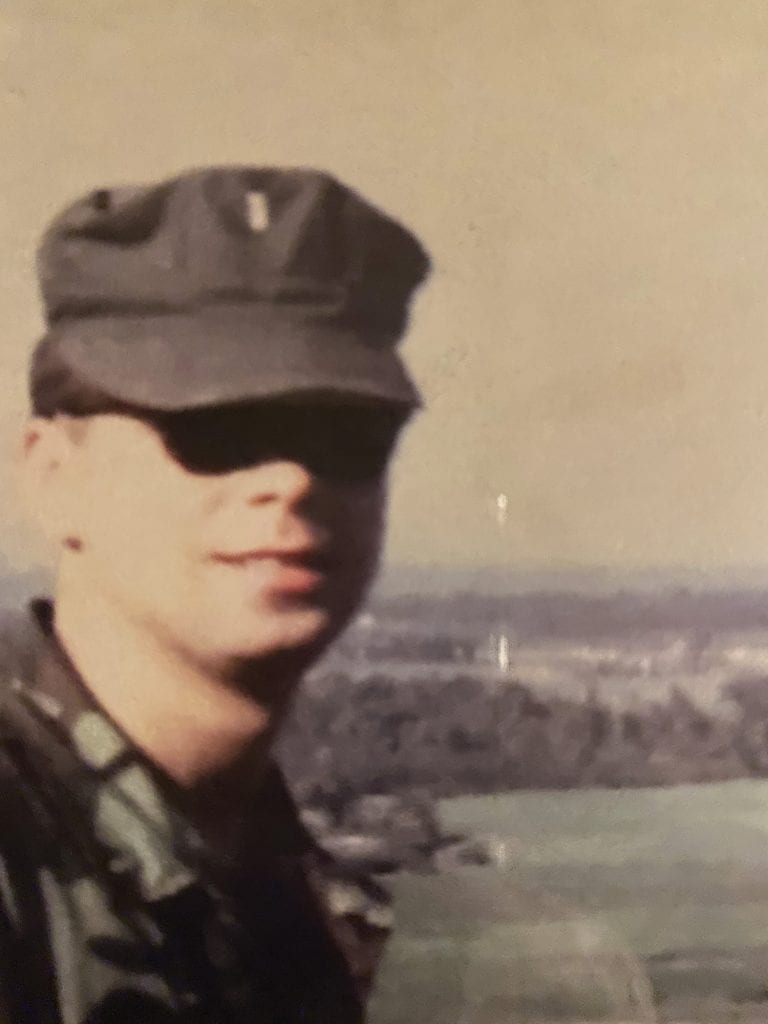
Writer’s Novels Will Chronicle Generations of Service in the Marines
A ‘Family Business’

Tom Hebert says his novels are a way of paying back the Marine Corps for all it has given him.
The story sounds like some of the fiction that Tom Hebert now devotes much of his non-working time to writing.
But it’s not.
Flashing back to when he was in high school, Hebert said he and his father, William, were having a talk about what he might do with his life, career-wise. The elder Hebert had just used his last match to light a cigarette, and after doing so, he noticed the ad on the back of the matchbook: ‘Become a CPA.’
“He handed me the matchbook cover, and I said, ‘OK, I’ll look into it,’ said Hebert, who would earn a degree in accounting at American International College. Eventually, he would join what was then one of the ‘Big 8’ accounting firms, Lybrand, Ross Bros. & Montgomery, and subsequently work in a number of other settings in Connecticut and Massachusetts, including Cambridge Credit Counseling, which he currently serves as chief financial officer.
“Discipline and leadership … that’s what I took away from the Marines. It shows in the respect I have for people, including the people who work for me — treating them well, treating them with respect.”
But while the saga of how he wound up in financial services is intriguing and makes for good reading, Herbert’s story is largely about what else he’s done with his life, starting with his time in the Marine Corps, which included a stint in Vietnam in 1970, as that conflict was beginning to wind down in many ways (much more on that later).
More recently, a second career has emerged: writing fiction, specifically about Marines. His first book, The Remains of the Corps, Volume I: Ivy & the Crossing, which he authored under the pseudonym Will Remain (with Remain being an anagram of Marine), came out early this year.
Covering the period from 1899 to 1917, several months before the U.S. entered World War I, it tells the story of Kenneth Remain (Will’s grandfather, who was born in Worcester and educated at Harvard), and the love triangle he enters along with Harvard classmate Lawrence Blakeslee and the “beautiful KatyKay Mulcahy.” The reader is also introduced to the 57 enlisted men of the fictional Fourth Platoon of the 87th Company of the true-to-life Third Battalion of the Sixth Marine Regiment.
“These gentlemen would have used a very large vocabulary, and I had to develop my vocabulary tremendously to have it fit for these two gentlemen .”
“When Kenneth takes KatyKay away from Lawrence, it creates problems between the two families that last for decades,” Hebert said, describing the plotline for the first book and those that will follow. “There’s this interaction between the two families that will last right up ’til the Vietnam War.”
The book is selling fairly well, but Hebert admits to not yet reaching the ‘break-even’ point that all self-publishers aspire to. Originally in hardcover, there’s now a paperback version of Remains of the Corps, as well as an e-book, and an audiobook will soon follow.
A second book is in progress, one that will take the story into the battlefields of France in World War I, with subsequent volumes covering the 1920s and ’30s. Eventually, his fictional characters will fight in World War II, which his father did, having taken part in the epic battle on Iwo Jima.

His father’s service — and his own — helped inspire the books, said Hebert, who told BusinessWest his writing is a way to give back to the Marine Corps, which he said gave him so much.
When asked what, specifically, he said the Corps gave him discipline, something he’s called on in all facets of his intriguing life, as well as some moments he won’t forget.
“Discipline and leadership … that’s what I took away from the Marines,” he explained. “It shows in the respect I have for people, including the people who work for me — treating them well, treating them with respect.”
Thus, Hebert’s saga represents the perfect Veteran’s Day story for this business publication: it’s a tale of military service and a family’s devotion to the Marine Corps, but also one about business — the one Hebert joined with some help from that matchbook cover, as well as the one he’s in now — and the challenging world of publishing.
The Write Stuff
“That’s the final straw!” Kenneth Remain said angrily, as he sat down heavily at a table in Jimmy’s Lunch. The melting snow on the brim of his boater and the shoulders of his benny testified to the fact that a sockdologer of a storm had clobbered Boston, an affront to the spring solstice of two days hence; though waning, the storm had not breathed its last.
Those are the first lines of The Remains of the Corps, Volume I: Ivy & the Crossing, and they provide not only a glimpse of Hebert’s mostly self-taught writing style, but also the immense amount of research that goes into writing a book set more than a century ago.

Tom Hebert says his second novel is almost fully researched and one-quarter written. He plans six volumes in all to tell the story of the Remains.
Indeed, before he could pen a story set in 1917, Hebert said he needed to know the vocabulary of 1917 — specifically the vocabulary used by people attending Harvard, hence words like ‘boater,’ a type of straw hat; ‘benny,’ a greatcoat; and ‘sockdologer,’ a synonym for any word connoting ‘whopper’ or ‘defining.’
“People talked much more formally back then — they used the king’s English,” he explained. “These gentlemen would have used a very large vocabulary, and I had to develop my vocabulary tremendously to have it fit for these two gentlemen.
“Any time my wife and I were out at bookstores and flea markets, I would pick up books on vocabulary, idioms, and more,” he went on. “And as part of my training, I went through those books and selected words, phrases, thoughts, and philosophies, and I would say, ‘I could use this in one of my books.’”
Several years of research and work learning how to write fiction went into The Remains of the Corps, Volume 1, said Herbert, noting, again, that his decision to dive into what he expects will become a six-book set was inspired by the service of his own family and a firm desire to give something back to the Corps.
With that, we’ll do what fiction writers often do: we’ll flash back — first to 1945, when William Hebert was ending his lengthy tour of duty with the Marines. He enlisted just after Pearl Harbor and served throughout the war — and even after it ended, as part of the peacekeeping force in Japan. Upon returning home, he built a house in Chicopee and went to work as a pressman for Springfield Newspapers, retiring at age 62.
“I work partly because I enjoy working — I thoroughly enjoy my position here. But also because it enables me to fund the things that I want to do in life — one of which is writing.”
Hebert said his father, like many who fought in World War II, didn’t talk much about his service. “But he was always singing the Marine Corps hymn when I was a boy,” Tom recalled, adding that, while his father never pushed him to join the service or that specific branch, he found himself signing up.
That was in May 1968, just a few months after the Tet Offensive, when the Vietnam War was in some ways at its height. Hebert had just earned that accounting degree at AIC, and attended Office Training School for 10 weeks, and then another five months at a specialty school for officers.
His military occupational specialty was to be a tank officer, so he then went to Camp Pendleton in California for two months. Around that same time, he got married and was told he could spend another 18 months in California.

Tom Hebert began his service in Vietnam a few months after the Tet Offensive in 1968, when the conflict was at its height.
But there was a quick change in plans, as he and several other tank officers were told there was an urgent need for their services in Vietnam.
“When we arrived at First Marine Division and met with the personnel officer, he said, ‘I don’t know why they sent you all here — I have three times as many tank officers as I need,’” he recalled. “That’s typical of the military, and my father had warned me about the bureaucratic aspects of being in the service.”
With his background in accounting, Hebert was eventually sent to the Central Service Agency, essentially a supply position — and wasn’t too happy with that assignment.
“After being there a short time, I went to the personnel officer and said, ‘I can’t do this — my father was in the Marines, he served at Iwo Jima … this is not why I joined,” he recalled. “He kicked me out of his office and said, ‘you’ll go where you’re told.’”
So he spent a year in Da Nang as — in the language of that time — an REMF, which stands for rear echelon mother… well, you can fill in the rest. Or, as they also said, ‘in the rear with the gear.’
Still, that time gave him a deep appreciation of the Corps and some valuable life lessons about leadership and teamwork.
When he came back home, he had a case of what was and still is known as ‘survivor guilt,’ which prompted him to publish a Vietnam War newsletter and also sell books through what was known as the Vietnam Book Store, a mostly mail-order operation.
Turning the Page
Longing to do more, Hebert eventually settled on the idea of writing about fictional Marines, but with art imitating life in many ways, especially when it comes to the Marine Corps being a generational phenomenon, or what Hebert calls a “family business.” It was that way for his family, and for the one he’s writing about as well, in stories told by the youngest generation.
That would be Will Remain, whose background is similar to Hebert’s, but with some important differences. Remain graduated from Harvard, not AIC, and upon graduation enlisted in the Marines and attended Officer Candidates School and Basic School in Quantico, Va. Instead of serving in the rear with the gear, he fought at Khe Sanh in 1967 and the Battle of Hue City during the Tet Offensive of 1968.
Hebert said he was inspired in many ways by the war novel Once an Eagle, written by Anton Meyer. A New York Times bestseller, it has been a favorite of American military men and women since it was penned in 1968, he noted.
“That book just fascinated me,” he told BusinessWest. “It was about the Army, and it covered several decades of one officer’s time. That book really inspired me to write.” Indeed, Hebert’s first forays into writing were non-fiction works about Meyer and his books.
He then embarked on the first installment of his novel, which wound up taking him a decade or so to write and prepare for publication. It includes dozens of illustrations by Tara Kaz that help bring the individual stories to life.
As for those stories, or the elements of his novels, he said the process of weaving them together is very much like that of putting together a jigsaw puzzle — which happens to be another of his hobbies; he said he’s put together more than 75 of them, with his favorite (unsurprisingly) being an image of the Iwo Jima Memorial in Washington.
“I have tons and tons of research material, and it’s all in pieces,” he went on, adding that, as he read books on history and vocabulary, for example, he would tear out the pages and keep them for future reference. “I take all those pieces — and we’re talking about an incredible amount of information — and put it together in a book.”
His second book is 95% researched and about 25% written, he said, adding that this segment details the battles in France during World War I. Book three, meanwhile, covers the period between the wars, and book four will likely take place on a fictional island in the Pacific during World War II.
Hebert writes when he’s not working, which means nights and weekends, and at age 73, he intends to keep on working — for several reasons.
“I work partly because I enjoy working — I thoroughly enjoy my position here,” he explained. “But also because it enables me to fund the things that I want to do in life — one of which is writing.”
As noted, his first book is off to a decent start, with about 300 copies sold and a far less expensive paperback now available. He’s optimistic, and excited, about the audiobook version, which will be read by noted narrator Grover Gardner, who, coincidentally (or not), has also read Once an Eagle.
“My hope, with the audiobook being read by someone so well-known, is that this will bring some attention to it and sell more books in print — that’s my goal, anyway,” he said, adding that this is far more an enjoyable hobby than a money-making enterprise. “I work to write.”
The Last Word
Hebert’s life has taken a number of twists and turns since his father glanced down at that matchbook cover and eventually handed it to him.
As noted at the top, some of it, including that episode, does sound like fiction, which is appropriate, said Hebert, because life really does imitate art in many ways.
His art certainly does. It’s a collection of tales about people. But it’s also about a business — a family business.
That’s what the Marine Corps became for him — and for those in the Remain family — and it’s a success story on a number of levels.
George O’Brien can be reached at [email protected]




